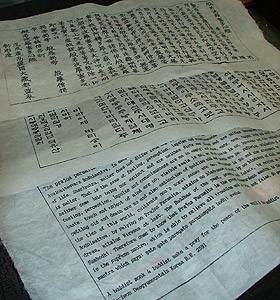反すう
反すう

私たちには、愛、思いやり、知恵を無限に発展させる可能性を秘めた貴重な人間の命があります。 その可能性をどう活かすか? ほとんどの場合、何が私たちの心を占めていますか? 自分の心を観察すると、過去と未来について反芻することに多くの時間が費やされていることがわかります。 思考と感情は、一見すると自発的に渦巻いていますが、時々それらをかき乱したり、少なくともそれらを打ち消す努力をしていないことを認めなければなりません. あなたは似ていますか? 私たちは何について反芻し、それが私たちの生活にどのような影響を与えるのでしょうか?
過去
One big topic of rumination is past hurts. “I was so hurt when my spouse said xyz.” “I worked so hard for the company but they didn’t appreciate me.” “My parents criticized the way I look,” and on and on. We have an excellent memory for all the times others have disturbed or disappointed us and can dwell upon these hurts for hours, reliving painful situations again and again in our minds. What is the result? We get stuck in self-pity and depression.
別のトピックは過去のものです 怒り. 私たちは、口論で誰が何を言ったかを繰り返し調べ、そのすべての詳細を分析し、熟考すればするほどますます動揺します。 私たちが座るとき 熟考する、対象に集中する 瞑想 難しい。 しかし、議論を振り返るとき、私たちの集中力は素晴らしいです! 実際、私たちは完璧に座ることができます 瞑想 姿勢、外見は非常に平和に見えますが、燃えています 怒り 一瞬たりとも気を散らさずに、過去の状況を一点に思い出すとき、私たちは内側にいます。 とき 瞑想 セッションの終わりにベルが鳴り、目を開けて、過去XNUMX分間熟考していたイベントが今ここで起こっていないことに気づきます. 実際、私たちは素敵な人々がいる安全な場所にいます。 反芻することの効果は何ですか 怒り? 明らかに、それはもっと 怒り そして不幸。
誤解されているという感情について反芻するとき、それはあたかも私たちが唱えているようです マントラ, “My friend doesn’t understand me. My friend doesn’t understand me.” We convince ourselves of this; the feeling becomes solid, and the situation looks hopeless. The result? We feel alienated, and we unnecessarily back away from those we want to be close to because we’re convinced they never will understand us. Or we may spill our neediness over the other person in an attempt to make them understand us in the way we want to be understood.
All our ruminations aren’t unpleasant, though. We can also spend hours recalling past pleasurable events. “I remember lying on the beach with this wonderful guy who adored me,” and off we go on a fantastic fantasy. “It was so wonderful when I won that reward and received the promotion I wanted,” and the real life situation appears like a movie to our conceptual mind. “I was so athletic and healthy. I could throw a ball like no one else and catch the ones no one else could,” and happy memories of past victorious sports events glide through our mind. The result? We feel the tinges of nostalgia for the past which is long-gone. Or, dissatisfied and anxious, we seek to re-create these events in the future, which leads to frustration because circumstances have changed.
これは瞑想者も例外ではありません。 素敵な気持ちを抱きしめて 瞑想 今後のセッションで再作成してみてください。 その間、それは私たちを逃れます。 私たちは深い理解の状態を思い出し、それ以来それが起こっていないので絶望を感じます. 執着せずに経験を受け入れることは、私たちにとって難しいことです。 私たちは、世俗的な経験をつかむのと同じように、精神的な経験にしがみつきます。
未来
We also spend lots of time ruminating about the future. We may plan things for hours. “First I’ll do this errand, then that, finally the third. Or would it be quicker to do them in the reverse order? Or maybe I should do them on different days?” Back and forth our mind swings trying to decide what to do. “I’ll go to this college, do graduate work at that one, and then send out my resume to land the job I’ve always wanted.” Or, for Dharma practitioners, while doing one retreat, we daydream about all the other practice opportunities that lie before us. “This teacher is leading a retreat in the mountains. I can go there and learn this profound practice. With that under my belt, I’ll go to this other retreat center and do a long retreat. When that is done, I’ll be ready for a private hermitage.” No practice gets done now because we’re too busy planning all the wonderful teachings we’re going to receive and retreats we’re going to do in the future.
Envisioning the future, we create idealistic dreams. “The Right Man/Woman will appear. S/He’ll understand me perfectly and then I’ll feel whole.” “This job will fulfill me completely. I’ll quickly succeed and be nationally recognized as excellent in my field.” “I’ll realize 菩提心 and emptiness and then become a great Dharma teacher with so many disciples who adore me.” The result? Our 添付ファイル 暴走し、非現実的な期待を抱くようになり、現状に失望します。 さらに、私たちは想像するだけで頭の中で立ち往生しているため、想像したことを行うための原因を作成しません。
Our future ruminations may also spin around with worry. “What if my parents get sick?” “What if I lose my job?” “What if my child has problems at school?” In school, we may not have been very good at creative writing, but in our heads we dream up fantastic dramas and horror stories. This results in our stress level zooming sky high as we anxiously anticipate tragedies that usually do not occur.
Our worries may zoom outward about the state of world. “What happens if the economy plummets? If the ozone layer keeps increasing? If we have more anthrax attacks? If the terrorists take over the country? If we lose our civil liberties fighting the terrorists?” Here, too, our creative writing ability leads to fantastic scenarios that may or may not happen, but regardless, we manage to work ourselves into a state of unprecedented despair. This, in turn, often leads to raging 怒り 権力に無関心で、すべてが腐っているのだから何をしても無駄だと思っているだけです。 どちらの場合でも、私たちは非常に暗いので、困難を改善し、善を生み出す方法で建設的に行動することを怠っています.
現在
私たちが生きなければならない唯一の時間は今です。 精神修行をするのは今だけです。 私たちが愛と思いやりを育てようとするなら、それは今この瞬間でなければなりません。 ですから、現在は絶えず変化していますが、それが私たちのすべてです。 人生は今起こります。 私たちの過去の栄光は、まさにそれです。 私たちの過去の傷は今起こっていません。 私たちの将来の夢は、単に将来の夢です。 私たちがでっち上げる未来の悲劇は、現時点では存在しません。
スピリチュアルな実践者は、以前の輝かしい瞬間を思い出し、完全に啓発された教師と至福の洞察に満ちた将来のエキゾチックな状況を夢見ているかもしれませんが、実際には、実践は今行われています. この瞬間、私たちの目の前にいる人は、私たちにとってすべての衆生を表しています。 すべての衆生の利益のために働くつもりなら、私たちは日常生活の中でこの一人、この普通の人から始めなければなりません。 目の前にいる人に心を開くには、規律と努力が必要です。 目の前にいる人とつながるには、過去や未来にとらわれず、完全に現在にいる必要があります。
ダルマの実践とは、この瞬間に私たちの心の中で起こっていることに対処することを意味します。 未来を征服することを夢見る代わりに 添付ファイル、対処しましょう 渇望 私たちは今持っています。 未来への恐怖に溺れるよりも、今起きている恐怖に気づき、調べてみましょう。
反作用の力
HHザ ダライ·ラマ 邪魔な感情を打ち消す力について語っています。 これらの反作用の力は、私たちが現実的または有益ではないものに対抗するために育成する特定の精神状態です. 無常と死への反省は、不安や興奮でぐるぐる回る精神状態に対する優れた対抗力です。 無常と自分自身の死について考えるとき、私たちの優先事項はより明確になります。 死は確かであるが、その時はそうではないことを私たちは知っているので、現在においてポジティブな精神状態を持つことが最も重要であることに気づきます. 心配は、私たちが持っているもの、行っているもの、現在のものに満足している心にとどまることはできません。 万物は儚く見えて 止まる 渇望 & しがみつく 私たちの幸せな思い出や楽しい空想は、それほど魅力的ではなくなります。
過去の混乱や未来のラプソディを心の投影として認識することで、それらにとらわれるのを防ぐことができます。 鏡に映る顔が本当の顔ではないのと同じように、私たちの記憶や空想の対象も同様に非現実的です。 それらは今起こっているわけではありません。 それらは単に心の中でちらつく精神的なイメージです。
私たちの貴重な人命の価値に反映することも反芻の私達の習慣を最小限に抑えることができます。 私たちの不思議な可能性が明確になり、現在の機会の希少性と値が示さ輝きます。 誰が私たちが現在に霊的にあまり良いと進歩を行うことができたときに、過去と未来について反芻したいですか?
私にとってうまく機能するXNUMXつの反作用の力は、これらすべての反芻が宇宙の中心である私を主演していることに気付くことです. すべての物語、すべての悲劇、喜劇、ドラマはすべて、すべての存在の中で明らかに最も重要な人物である私を中心に展開しています。 宇宙を私に凝縮する心の力を認めるだけで、私の反芻の愚かさが分かります。 無数の衆生がいる巨大な宇宙があり、それぞれが幸福を望んでおり、私のように激しく苦しむことを望んでいません. それでも、私の自己中心的な心はそれらを忘れて、私に集中します。 おまけに、それは本当に私に焦点を合わせているわけではなく、私の過去と未来を中心に回っていますが、どちらも現在存在しません。 これを見て、私の 自己中心性 宇宙で起こっているすべてのことで自分だけを心配することを正当化することはできないので、蒸発します。
最も強力な反作用の力は、最初から具体的な「私」が存在しないことを認識している叡智です。 これらすべての考えがぐるぐる回っているのは誰ですか? これらすべての反芻をしているのは誰ですか? 私たちが検索しても、真に存在する私はどこにも見つかりません。 このじゅうたんの上や中に具体的なわたしが見出されないように、このじゅうたんにも具体的なわたしは見出されない。 ボディ そして心。 どちらも、自分の力で存在する真に存在する人物が等しく空です。
この理解で、心はリラックスします。 反芻は終わり、知恵と思いやりをもって、 ボディ そして心は世界に喜びを広めることができます。
トゥブテン・チョドロン師
由緒あるチョドロンは、ブッダの教えを日常生活に実際に適用することを強調しており、特に西洋人が理解し実践しやすい方法で説明することに長けています。 彼女は温かく、ユーモラスで、明快な教えで有名です。 彼女は 1977 年にインドのダラムサラでキャブジェ リン リンポチェによって仏教の修道女として叙階され、1986 年には台湾で比丘尼 (フル) の叙階を受けました。 彼女の完全なバイオを読む.


